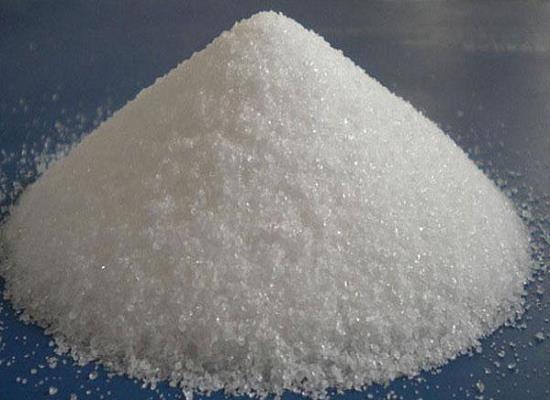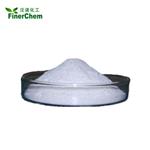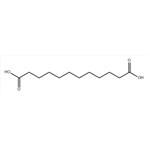Dodecanedioic acid: pharmacokinetics and applications
Sep 28,2023
General Description
Dodecanedioic acid is a dicarboxylic acid used in the synthesis of polyamides or special nylons. It exhibits excellent chemical resistance, mechanical strength, and thermal stability. Polyamides containing dodecanedioic acid are used in engineering plastics, coatings, adhesives, automotive parts, electrical connectors, industrial equipment, gears, bearings, and conveyor belts. DDDA has been investigated as an alternative fuel substrate in parenteral nutrition, with potential benefits for glucose utilization and glycogen storage. Overall, dodecanedioic acid plays a crucial role in the development of materials with diverse applications in various industries, offering high performance and durability.

Figure 1. Dodecanedioic acid
Pharmacokinetics
The pharmacokinetics of dodecanedioic acid was investigated in male Wistar rats through intravenous bolus injection. Plasma samples were collected at various time points and analyzed using an improved high-performance liquid chromatographic method to measure dodecanedioic acid and its hydrolysis product, nonesterified dodecanedioic acid (NEDA). The urinary excretion of dodecanedioic acid over 24 hours was found to be 1.54 +/- 0.37 micromol, equivalent to approximately 0.67% of the administered dose. Different kinetics models were considered, incorporating central and peripheral compartments for both triglyceride and free forms, with transportation between compartments described by linear, carrier-limited, or time-varying mechanisms. Ultimately, a three-compartment model was used, assuming linear transfer of dodecanedioic acid to NEDA through a peripheral compartment, and carrier-limited tissue uptake of NEDA. Results showed that dodecanedioic acid exhibited a large volume of distribution (~0.5 l/kg body weight) with rapid clearance from plasma (0.42 min-1), while NEDA had a very small volume of distribution (~0.04 l/kg body weight) and a tissue uptake with a maximal transport rate of 0.636 mM/min. In conclusion, this study indicates that dodecanedioic acid is quickly hydrolyzed, and both the triglyceride and nonesterified forms are excreted in urine to a minimal extent. The tissue uptake of NEDA suggests it could provide substantial energy delivery if included in parenteral nutrition formulations. Additionally, the triglyceride form requires half the amount of administered sodium compared to the free diacid form. 1
Applications
Potential alternative fuel substrate
Dodecanedioic acid has been investigated as a potential alternative fuel substrate in parenteral nutrition. A study aimed to examine the effect of dodecanedioic acid infusion on insulin-stimulated glucose uptake in individuals with non-insulin-dependent diabetes mellitus (NIDDM) compared to healthy volunteers. The results showed that dodecanedioic acid infusion led to a significant decrease in whole-body glucose uptake in both groups, with a more pronounced effect observed in NIDDM patients. The M value, which represents glucose uptake per kilogram of fat-free mass, was significantly lower in NIDDM patients compared to controls. Furthermore, urinary excretion of dodecanedioic acid over 24 hours was significantly lower in NIDDM patients, indicating minimal elimination of dodecanedioic acid from the body. The infusion of dodecanedioic acid also resulted in a decrease in non-protein respiratory quotient (RQ), suggesting a reduction in glucose utilization and oxidation. These findings suggest that dodecanedioic acid reduces glucose uptake and oxidation, potentially through a mechanism of substrate competition. Therefore, it may serve as a useful alternative substrate in enteral or parenteral nutrition, preserving glucose utilization and increasing glycogen stores, particularly in conditions like NIDDM where impaired insulin-induced glucose uptake and oxidation are observed. 2
Polyamides and special nylons
Dodecanedioic acid is primarily used as a building block in the synthesis of nylon 6,12 and nylon 5,12. These polyamides exhibit excellent chemical resistance, mechanical strength, and thermal stability compared to other nylons. The presence of DDDA in their structure imparts properties such as high melting points, moisture resistance, and low water absorption, making them suitable for various demanding applications. Polyamides containing dodecanedioic acid are widely used in engineering plastics, coatings, and adhesives. They can be molded into strong but lightweight components for automotive parts, electrical connectors, and industrial equipment. Due to their good dimensional stability and resistance to wear, these materials are also employed in gears, bearings, and conveyor belts. Overall, dodecanedioic acid plays a crucial role in the development of polyamides and special nylons, enabling the creation of materials with diverse applications in various industries. 3
Reference
1. Gaetano A, Mingrone G, Castagneto M, Benedetti G, Greco AV, Gasbarrini G. Kinetics of dodecanedioic acid triglyceride in rats. Am J Physiol. 1999 Mar;276(3):E497-502.
2. Mingrone G, De Gaetano A, Greco AV, Capristo E, Benedetti G, Castagneto M, Gasbarrini G. Dodecanedioic acid infusion induces a sparing effect on whole-body glucose uptake, mainly in non-insulin-dependent diabetes mellitus. Br J Nutr. 1997 Nov;78(5):723-735.
3. Cao W, Wang Y, Luo J, Yin J, Wan Y. Role of oxygen supply in α, ω-dodecanedioic acid biosynthesis from n-dodecane by Candida viswanathii ipe-1: Effect of stirring speed and aeration. Eng Life Sci. 2017 Dec 27;18(3):196-203.
- Related articles
- Related Qustion
- Dodecanedioic Acid: Metabolic Health, Sustainable Production, and Regenerative Medicine Feb 18, 2024
Dodecanedioic acid enhances metabolic health, enables sustainable industrial production, and supports regenerative medicine through innovative applications.
- Uses and Preparation of Dodecanedioic acid Oct 23, 2019
Dodecanedioic acid (DDDA, C12H22O4, CAS registry No. 693-23-2) has achieved industrial importance in the manufacturing of polyamides, polyesters, lubricating oils and plastic.
2-Phenylimidazole is used in wastewater treatment, specifically for petrochemical wastewater and phosphorus removal.....
Sep 28,2023APIPaliperidone palmitate is an effective treatment for schizophrenia. It has a stable half-life, lower risk of side effects, and improved medication adherence.....
Sep 28,2023APIDodecanedioic acid
693-23-2You may like
Dodecanedioic acid manufacturers
- Dodecanedioic acid
-

- 2025-12-15
- CAS:693-23-2
- Min. Order:
- Purity: 0.99
- Supply Ability:
- Dodecanedioic acid
-

- $2.00 / 25KG
- 2025-12-15
- CAS:693-23-2
- Min. Order: 1KG
- Purity: 99%
- Supply Ability: 5000mt/year
- Dodecanedioic acid
-

- $1.00 / 1KG
- 2025-12-12
- CAS:693-23-2
- Min. Order: 1KG
- Purity: 99%
- Supply Ability: 200000KG






